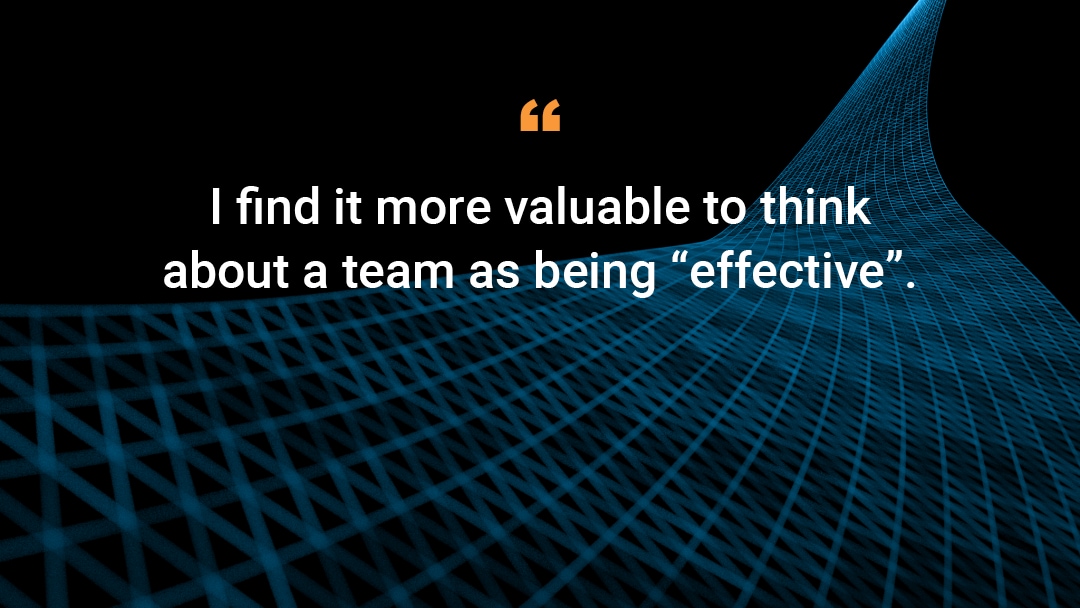Better, or More Effective?

A colleague asked me to share my thoughts on building a "better team". I confess, I stumbled on the word "better". Better than what exactly? Sure, in the essence of kaizen (a Japanese term encapsulating the idea of continuous improvement), a team can always be better. But I find it more valuable to think about a team as being "effective".
What makes a team effective? And effective at what, exactly? I started managing early in my career. I had a wonderful manager who foresaw how my style and approach would be useful in managing staff. I made mistakes and learned from them. I also did things that were successful, and observed others do the same. In thinking about the question of "what makes a team effective", I draw from direct experience, observations, and from literature (e.g., The first 90 Days, Harvard Business Review Top 10 articles on people management to name a couple).
There are a number of elements that enable a team to be effective such as working efficiently and harmoniously as a team, with other stakeholders within the larger organization, and with customers where needed. All aimed to achieve common business goals, whether that's providing security in a software product or a customer network, or building a set of new product features that deliver high value to the customer.
There are different layers when we talk about effectiveness: Let's start with looking from the inside out.
From within a team, it's crucial to be diverse: in thoughts, experience, and skills. Being diverse allows us to better balance our biases, perspectives, and experiences, ultimately producing better results than identical viewpoints. Trust and respect amongst the team are absolutely necessary. Who really wants to work in a team where they don't feel that they are trusted and respected by their colleagues? Will they be able to trust and respect others if they can't see it within their own team? This was recently noted by Google research as "psychological safety" and "dependability" which I believe to be a very effective way to unpack this element. In Amy Edmondson's book "The Fearless Organization", she defines psychological safety as "a climate in which people are comfortable expressing and being themselves. More specifically, when people have psychological safety at work, they feel comfortable sharing concerns and mistakes without fear of embarrassment or retribution". When you have a team culture composed of staff who provide an environment where everyone strives for the best, where mistakes are treated as an opportunity to grow, and employees collaborate with each other for solving puzzles, for asking questions, and learning, you have a stronger, more effective team at executing a particular organizational mission and vision.
The above elements shouldn't be foreign when thinking about the next layer of effectiveness, how the team interacts with others in the organization. I continue to witness how having healthy, collegial relationships with members of engineering, operations, product management, and customers leads to significant business outcomes that wouldn't be otherwise possible.
From an organizational perspective, I find a team to be especially effective at supporting the business when their strategies, prioritizations, and actions have the company and the team's visions and missions in mind. It's healthy to step back from time to time and look at how the work the team does supports the business. The wider view helps make decisions based on the business goals. It is also just as important for the team to be sensitive to how the business is evolving and what it's prioritizing. This way the team is regularly in touch with the bigger picture and not secluded only to their day-to-day tasks.
Your own experience and observation may be aligned with what I have noted so far, but there's a crucial anchor to all of this that I would be remiss not to mention: management. The management team plays a crucial role in building and shaping what an effective team looks like. A leader is a role model who provides an example for behavior, shows what is valued, and determines what gets rewarded and recognized. Messaging priorities, values, and expectations is crucial. This is emphasized through hiring decisions as well. Hiring, in general, is an imperfect process. However, good hiring decisions directly implement elements related to what makes a team effective. They also indirectly emphasize to the rest of the organization what is important to the team.
A couple of months ago, as part of my goal to continue to emphasize team values, I reminded my team of the concept of an "apology and failure budget". This is something I learned from my manager and my colleagues that has been a terrific addition to my mental model of running an organization. During the presentation, I shared with my team some examples of where I used my apology and failure budget with my boss or colleagues. Giving staff the space to make mistakes and learn from them, while demonstrating that even "management" is comfortable talking and acknowledging instances of that for themselves, is one aspect of being a role model for the organization.
I like to remind myself, and the team, of this key phrase: The way we get work done is just as important as the work itself and the results. The questions to ask ourselves: are we willing to achieve business results at the cost of having a team that is, in the long term, ineffective? Or are we trying to build a sustainable function that supports the business today as well as the future as the business evolves?




